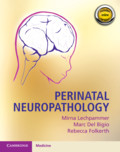Book contents
- Perinatal Neuropathology
- Perinatal Neuropathology
- Copyright page
- Contents
- Preface
- Acknowledgments
- Abbreviations
- Section I Techniques and Practical Considerations
- Approach to Autopsy of the Perinatal Nervous System
- Chapter 1 Clinical Considerations
- Chapter 2 Imaging
- Chapter 3 External Exam of the Fetus/Infant
- Chapter 4 Autopsy and Research Consent
- Ancillary Studies
- Prosection Techniques
- Tissue Selection
- Reporting
- Section 2 Human Nervous System Development
- Section 3 Stillbirth
- Section 4 Disruptions / Hypoxic-Ischemic Injury
- Section 5 Malformations
- Section 6 Perinatal Neurooncology
- Section 7 Spinal and Neuromuscular Disorders
- Section 8 Eye Disorders
- Section 9 Infections: In Utero Infections
- Section 10 Metabolic / Toxic Disorders: Storage Diseases
- Section 11 Forensic Neuropathology
- Appendix 1 Technical Considerations in Perinatal CNS
- Index
- References
Chapter 1 - Clinical Considerations
from Approach to Autopsy of the Perinatal Nervous System
Published online by Cambridge University Press: 07 August 2021
- Perinatal Neuropathology
- Perinatal Neuropathology
- Copyright page
- Contents
- Preface
- Acknowledgments
- Abbreviations
- Section I Techniques and Practical Considerations
- Approach to Autopsy of the Perinatal Nervous System
- Chapter 1 Clinical Considerations
- Chapter 2 Imaging
- Chapter 3 External Exam of the Fetus/Infant
- Chapter 4 Autopsy and Research Consent
- Ancillary Studies
- Prosection Techniques
- Tissue Selection
- Reporting
- Section 2 Human Nervous System Development
- Section 3 Stillbirth
- Section 4 Disruptions / Hypoxic-Ischemic Injury
- Section 5 Malformations
- Section 6 Perinatal Neurooncology
- Section 7 Spinal and Neuromuscular Disorders
- Section 8 Eye Disorders
- Section 9 Infections: In Utero Infections
- Section 10 Metabolic / Toxic Disorders: Storage Diseases
- Section 11 Forensic Neuropathology
- Appendix 1 Technical Considerations in Perinatal CNS
- Index
- References
Summary
The placenta is best considered a vital organ of the fetus, as essential as the heart or lungs. In addition, it serves as the “diary” of the pregnancy, often indicating antepartum (maternal and exogenous) influences. It should be examined as a matter of routine in every stillbirth or adverse neonatal outcome for clues to underlying contributing factors.
- Type
- Chapter
- Information
- Perinatal Neuropathology , pp. 1 - 2Publisher: Cambridge University PressPrint publication year: 2021



